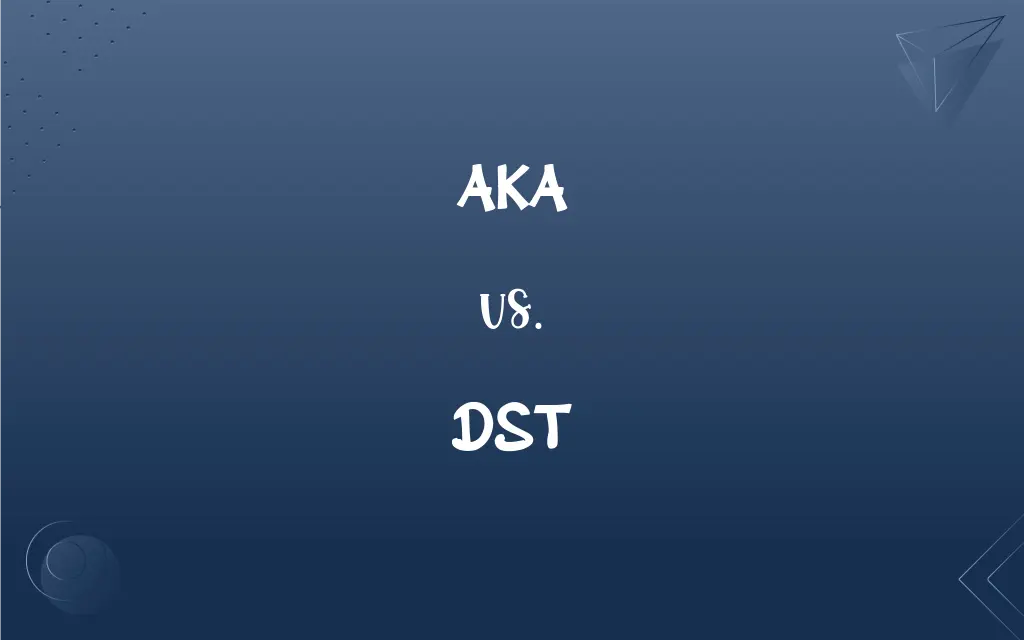AKA vs. DST: What's the Difference?
Edited by Aimie Carlson || By Harlon Moss || Published on February 15, 2024
AKA (also known as) is used to indicate an alternative name or alias, while DST (Daylight Saving Time) refers to the practice of setting clocks forward to extend evening daylight.

Key Differences
AKA stands for "Also Known As," commonly used to indicate aliases, nicknames, or any other alternative name. It is often seen in legal, criminal, or entertainment contexts. In contrast, DST stands for Daylight Saving Time, a system of adjusting clocks during warmer months to extend daylight in the evenings. The primary purpose of DST is to make better use of daylight and conserve energy.
In its use, AKA is a versatile term that can be applied in various scenarios where a person or entity is known by more than one name or title. For instance, an author might use a pen name alongside their real name. On the other hand, DST is a specific time-related concept observed in many countries, where clocks are set forward by one hour in spring and set back again in autumn, effectively shifting the time of daylight.
AKA does not imply any specific time or seasonal change but is merely a linguistic tool used for clarification or additional information. It is a phrase that has become commonplace in everyday language, particularly in biographies, resumes, or legal documents. Meanwhile, DST impacts daily activities, schedules, and even the economy, as it affects opening hours of businesses, broadcasting schedules, and can influence health and chronobiological rhythms.
The usage of AKA is mainly static, not influenced by season or geography, and remains consistent in its meaning across different contexts. In contrast, the application of DST varies geographically; not all countries or regions observe DST, and those that do may have different start and end dates. DST is a concept that is subject to political decisions and public opinion, often debated for its merits and drawbacks.
When referring to AKA, it's about identity and recognition, helping distinguish or associate different names or titles with the same individual or entity. Whereas discussing DST involves understanding its influence on daily life, energy consumption, and even health, as it involves changing the clocks to artificially modify the perceived time of day.
ADVERTISEMENT
Comparison Chart
Meaning
Also Known As - indicates an alternative name
Daylight Saving Time - clock adjustment for extended daylight
Context of Use
Identifying alternative names or aliases
Time and seasonal change
Purpose
Clarification of identity
Energy conservation and better use of daylight
Influence
Linguistic, used in various contexts
Practical, affects daily life and schedules
Variability
Constant in meaning
Varies by region and is subject to change
ADVERTISEMENT
AKA and DST Definitions
AKA
Used to introduce pseudonyms or nicknames.
Mark Twain, AKA Samuel Clemens, wrote The Adventures of Tom Sawyer.
DST
Adjusting clocks forward for more evening daylight.
We switch to DST in the spring to enjoy longer evenings.
AKA
Introduces other titles or names.
The CEO, AKA the founder, addressed the meeting.
DST
Involves setting clocks one hour ahead.
Remember to set your clocks forward for DST tonight.
AKA
Signifies additional identity information.
The criminal, AKA the Fox, was finally caught.
DST
A seasonal time change in many countries.
DST is not observed in all countries globally.
AKA
Connects different names referring to the same entity.
The company, AKA the market leader, announced its new product.
DST
A practice to extend daylight in warmer months.
DST helps save energy by reducing evening light usage.
AKA
Indicates an alternative name or alias.
Robert Downey Jr., AKA Iron Man, is a popular actor.
DST
Aims at better use of daylight.
DST shifts our schedule to align with daylight hours.
AKA
Alternative case form of AKA
DST
Abbreviation of destination
FAQs
Can AKA refer to a company name?
Yes, it can refer to alternate names for companies or products.
How often does DST occur?
DST typically occurs twice a year, in spring and autumn.
What does AKA stand for?
AKA stands for "Also Known As."
Is AKA used in legal documents?
Yes, it's commonly used to indicate aliases in legal contexts.
Can AKA refer to a fictional character?
Yes, it's often used for characters' aliases or pseudonyms.
What is the purpose of DST?
DST is used to extend evening daylight and save energy.
Is AKA used globally?
Yes, it's widely understood in many languages and cultures.
Do all countries follow the same DST schedule?
No, the start and end dates vary by country.
Why do some regions not use DST?
Non-use of DST can be due to geographical, cultural, or practical reasons.
Is AKA always related to people?
No, it can relate to any entity with multiple names.
Is AKA used in academic writing?
Yes, particularly when referring to authors or historical figures.
How does DST impact energy consumption?
It's intended to reduce evening energy use by providing more daylight.
What are the cons of DST?
Critics mention disrupted sleep patterns and the complexity of time changes.
Does AKA imply a legal name change?
No, it's just an alternate name, not necessarily legal.
Does DST affect international travel?
Yes, it can impact flight schedules and travel planning.
Can AKA be used in everyday conversation?
Absolutely, it's common in informal and formal speech.
Can technology automatically adjust for DST?
Many modern devices automatically update for DST changes.
Are there health impacts associated with DST?
Yes, some studies suggest it can affect sleep and circadian rhythms.
How long has DST been in practice?
DST has been used in various forms since the early 20th century.
How is AKA different from a pseudonym?
A pseudonym is a type of AKA, specifically for false names.
About Author
Written by
Harlon MossHarlon is a seasoned quality moderator and accomplished content writer for Difference Wiki. An alumnus of the prestigious University of California, he earned his degree in Computer Science. Leveraging his academic background, Harlon brings a meticulous and informed perspective to his work, ensuring content accuracy and excellence.
Edited by
Aimie CarlsonAimie Carlson, holding a master's degree in English literature, is a fervent English language enthusiast. She lends her writing talents to Difference Wiki, a prominent website that specializes in comparisons, offering readers insightful analyses that both captivate and inform.







































































